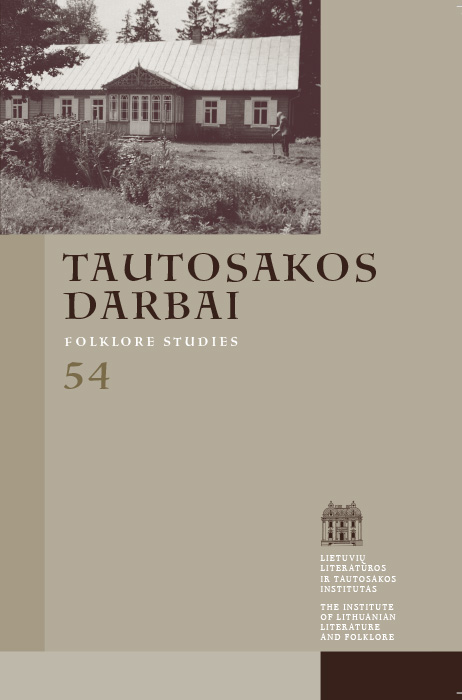Janinos Degutytės žemės patirtis
Santrauka
Remiantis poetės Janinos Degutytės 1972–1989 metų laiškais, straipsnyje fenomenologiškai aprašoma jos žemės patirtis. Iš miesto kilusi poetė patenka į sodybą, pirminį žemdirbiškos kultūros centrą, ir atpažįsta ją kaip vietą, labiausiai jai tinkamą gyventi, kaip vietą, kurioje jai gera ir ramu. Vietos tikimą jai parodo jautrus ir fiziškai silpnas jos kūnas, kuris čia atgauna jėgas.
Gyvenimas sodyboje – tai buvimas ant žemės, o kartu ir buvimas ore. Žemės patirtis išskleidžiama keliais būdais – augalų auginimu, žemės duodamo maisto valgymu, vaikščiojimu. Visi šie būdai formuoja ir performuoja kūną, jutimus ir žinojimą.
Straipsnyje taip pat keliamas klausimas, ar tokia savaimė žemės patirtis galėtų būti suvokta kaip žemdirbiškos tradicijos atliepinys.
Atsisiuntimai
Skaitomiausi šio autoriaus(ų) straipsniai
- Giedrė Šmitienė, Neringa Markevičienė, Raštų, kaip ir laiškų, nepasirenki – jie tave ištinka. Paskelbus Balio Sruogos laiškus iš Štuthofo , Tautosakos darbai: T 68 (2024): Tautosakos darbai
- Lina Būgienė, Giedrė Šmitienė, Jurga Jonutytė, Janinos Degutytės laiškų leidinį pasitinkant , Tautosakos darbai: T 69 (2025): Tautosakos darbai
- Giedrė Šmitienė, Tarprūšinė patirtis sergant. Antropologinė prieiga prie kelių Janinos Degutytės tekstų , Tautosakos darbai: T 64 (2022)
- Giedrė Šmitienė, Jurga Jonutytė, Pratarmė , Tautosakos darbai: T 68 (2024): Tautosakos darbai
- Rūta Latinytė, Giedrė Šmitienė, Vaiva Aglinskas, Irena Žilienė, Informacija , Tautosakos darbai: T 68 (2024): Tautosakos darbai
- Giedrė Šmitienė, Neakivaizdinis pokalbis su Maurice’u Merleau-Ponty. Tradicinės kultūros tyrimas juslinio suvokimo plotmėje , Tautosakos darbai: T 47 (2014)
- Giedrė Šmitienė, Paprasti laiškai: kontekstinio tyrimo metodika , Tautosakos darbai: T 55 (2018)
- Giedrė Šmitienė, Linkėjimai čia visomis progomis tie patys – laisvės ir namų. Kazimieros Kairiūkštytės-Galaunienės laiškai iš tremties (1953–1955) , Tautosakos darbai: T 53 (2017)
- Giedrė Šmitienė, „Man visa lengva“: etnologinis sąmonės tyrimas , Tautosakos darbai: T 53 (2017)
- Giedrė Šmitienė, Trys laiškai apie laisvę ir mitus , Tautosakos darbai: T 53 (2017)
